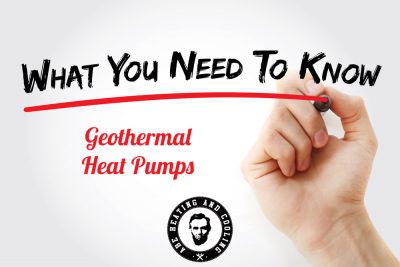“Abe's Heating and cooling were professional and on time. they helped me with two time sensitive projects and did excellent work. I know who I'll be calling if I should ever need an HVAC technician.”
Blog
 Furnaces and air conditioners are familiar heating and cooling appliances. But geothermal heat pumps give you another option that is well worth considering.
Furnaces and air conditioners are familiar heating and cooling appliances. But geothermal heat pumps give you another option that is well worth considering.
Most people don’t know much about geothermal technology. That is a shame, because it has much to recommend it.
Surface temperatures can rise or fall by as much as 80-100 degrees between January and July. But if you go a few feet underground, temperatures will remain in the same 50-60 degree range all year long.
Geothermal heat pumps exploit the differential between surface and below-ground temperatures to heat or cool homes and other indoor spaces. Geothermal heat pumps circulate a liquid solution through a network of pipes that travel beneath the ground and back into your home in a loop. This liquid has the ability to absorb and later release heat, and that is what allows the geothermal heat pump to function.
Depending on the season, the ground is used as either a source for heat (in winter) or as a sink where heat can be released (in summer). A geothermal system includes a heat exchanger that can transfer heat into or out of the liquid solution, and a compressor that can concentrate it for use as a source of indoor heat in the winter. A network of ducts can be used to distribute the heated or cooled air, and in some systems the heat can also be diverted to heat water.
If you’re looking to make a change in your heating and cooling system, geothermal might be the way to go. Here are six characteristics that make geothermal heat pumps so interesting and unique …
Temperature extremes between above and below ground are what drive a geothermal heat pump. These differentials are enough to make these appliances a legitimate four-season option in all 50 states.
In frigid northern environments, geothermal heat pumps are usually installed with an auxiliary heating unit that can supplement the heat pump’s performance when outdoor temperatures drop below freezing.
Closed loop heat pumps that circulate liquid and heat between the ground and an indoor space are standard. Open loop systems, on the other hand, connect to ponds or wells and circulate water in and out of the system, using groundwater as the source and sink for heat.
Neither system is inherently less efficient than the other. Nevetheless, the dual options do give flexibility to those who have access to ground water on or near their land. In at least some circumstances, open loop systems might be more the more cost-effective choice.
The indoor components of a geothermal heat pump do a decent amount of work. But they can still last for up to 25 years without needing to be replaced, which is more than you can expect from the typical furnace or air conditioner.
As for the underground pipe network, this can easily last for 50 years or more. It is kept safe and protected from wear or tear by the earth that envelops it.
While furnaces must produce heat through combustion, geothermal heat pumps only have to extract it from a natural source. This means lower energy consumption during operation. Geothermal heat pumps are also more energy-efficient than air conditioners, which must work harder to extract heat from the air than heat pumps have to work absorbing it from the ground.
To quantify it in numbers, heat pumps can cut a homeowner’s energy bills by up to two-thirds, in comparison to a conventional heating and cooling system.
Geothermal heat pumps can be connected to an existing electrical system. Unlike furnaces, they don’t require a home to be hooked up to a natural gas line. Unlike boilers, they don’t require the burning of fuel oil to produce heat. In comparison to air conditioners, their consumption of electricity is lower.
If you installed a rooftop solar energy system in conjunction with a geothermal heat pump, you could heat and cool your home entirely with renewable energy, an option that doesn’t exist if you use conventional heating technology.
Some of these savings come from the technology’s unmatched energy efficiency. But the longer lifespan of a geothermal heat pump, and the reduced wear and tear on its parts, means lower repair bills and a longer timeframe to pay off the costs associated with the purchase and installation of the system.
Geothermal heat pumps are pricier than conventional heating and cooling equipment. But they save so much energy after purchase that they remain the most economical choice in many instances.
At ABE Heating and Cooling we know all about geothermal heat pumps. We install geothermal systems produced by GeoComfort, ClimateMaster and Bosch, some of the most respected names in this sector of the HVAC industry. ABE offers expert installation services, quality financing packages and access to the best geothermal technology around. We are located in Brighton, Colorado and serve the entire Denver Metro Area, and we invite you to contact us today to learn more about geothermal heating and cooling systems.